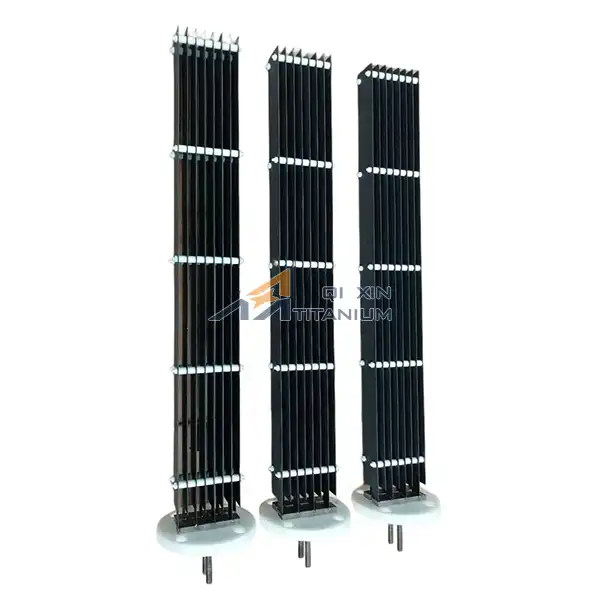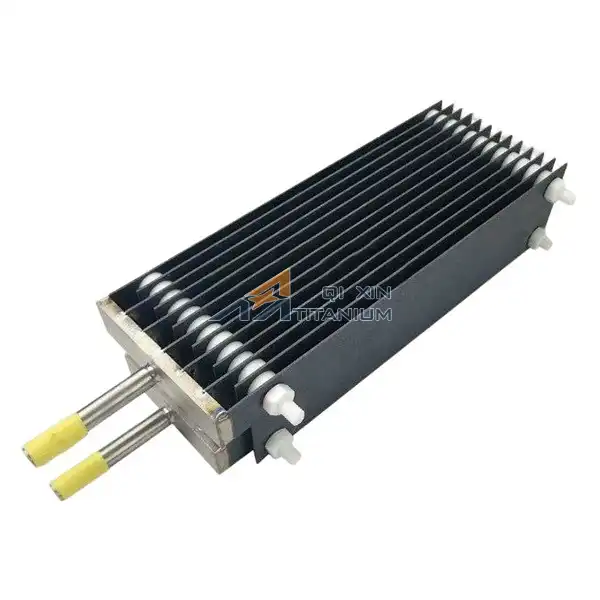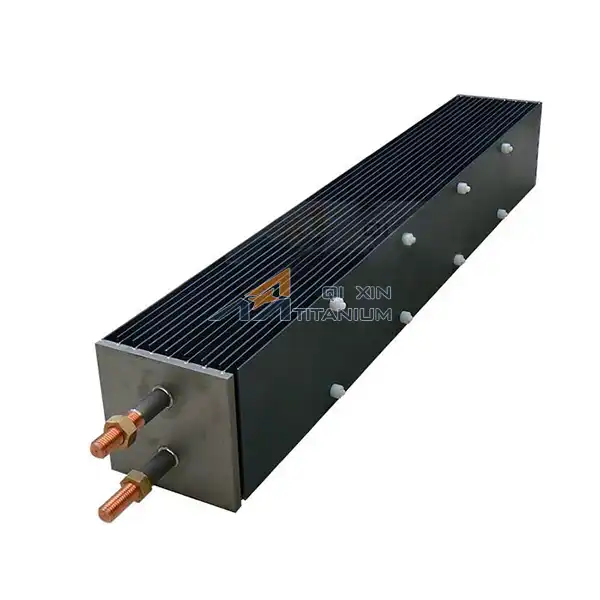Exploring the Durability and Efficiency of Electrolyzed Water Titanium Mesh Electrode
2025-04-15 09:29:52
Electrolyzed water titanium mesh electrodes have revolutionized various industries with their exceptional durability and efficiency. These advanced electrodes combine the strength of titanium with innovative mesh design, offering superior performance in electrolysis processes. By harnessing the power of electrolyzed water technology, these electrodes provide sustainable solutions for water treatment, disinfection, and industrial applications. Their unique properties enable enhanced conductivity, reduced energy consumption, and prolonged lifespan, making them a preferred choice for professionals seeking reliable and eco-friendly alternatives. As we delve deeper into the world of electrolyzed water titanium mesh electrodes, we'll uncover their remarkable attributes and explore how they're shaping the future of electrochemical processes.
Unraveling the Technology Behind Electrolyzed Water Titanium Mesh Electrodes
The Composition and Structure of Titanium Mesh Electrodes
Titanium mesh electrodes are crafted from high-grade titanium, known for its exceptional corrosion resistance and durability. The mesh structure provides an expansive surface area, facilitating efficient electron transfer during electrolysis. This design allows for optimal contact between the electrode and the electrolyte, enhancing the overall performance of the system.
The Electrolysis Process and Its Role in Water Treatment
Electrolysis is a fundamental process in water treatment, where electrical current is passed through water to induce chemical reactions. The titanium mesh electrode serves as either an anode or cathode, facilitating the breakdown of water molecules into hydrogen and oxygen. This process effectively removes contaminants and produces electrolyzed water with various beneficial properties.
Advantages of Titanium as an Electrode Material
Titanium's inherent properties make it an ideal material for electrodes. Its exceptional resistance to corrosion, even in harsh chemical environments, ensures longevity. The metal's high strength-to-weight ratio allows for the creation of durable yet lightweight electrodes. Furthermore, titanium's biocompatibility makes it suitable for applications in sensitive environments, including water purification for human consumption.
Assessing the Durability of Electrolyzed Water Titanium Mesh Electrodes
Corrosion Resistance and Longevity
One of the standout features of electrolyzed water titanium mesh electrodes is their exceptional corrosion resistance. Titanium naturally forms a stable oxide layer when exposed to air or water, which effectively shields the metal from further degradation. This protective layer not only prevents corrosion but also has a self-healing capability, allowing the electrode to recover from minor damage. As a result, titanium electrodes have a much longer lifespan compared to traditional materials, minimizing maintenance needs, downtime, and overall operating costs in industrial settings.
Mechanical Strength and Stability
The mesh structure of electrolyzed water titanium electrodes offers a perfect balance of mechanical strength and flexibility. This design enables the electrodes to endure physical stress without compromising their shape, ensuring durability over long-term use. Unlike solid electrodes, the mesh can flex and adapt to different conditions, making it less prone to cracking or warping. Its stable and resilient nature ensures that the electrodes deliver consistent and reliable performance, even under fluctuating operational pressures, enhancing efficiency and longevity in industrial applications.
Resistance to Fouling and Scaling
Fouling and scaling are frequent challenges in electrochemical processes, often leading to a decline in electrode performance and efficiency. Electrolyzed water titanium mesh electrode, however, are designed with a smooth surface that naturally resists the buildup of mineral deposits, making them less prone to these issues. This resistance helps maintain steady performance by preventing the accumulation of contaminants. As a result, the need for frequent maintenance and cleaning is reduced, saving both time and operational costs while ensuring the electrodes remain effective over longer periods.
Evaluating the Efficiency of Electrolyzed Water Titanium Mesh Electrodes
Enhanced Surface Area and Electron Transfer
The mesh structure of titanium electrodes offers a significantly larger surface area than traditional solid plate electrodes. This expanded surface allows for more efficient electron transfer during the electrolysis process, enhancing the overall reaction rate. With more active sites available for interaction, titanium mesh electrodes can achieve higher conversion rates, making the process more energy-efficient. This increased efficiency results in better performance and faster results across various applications, ultimately improving the effectiveness and productivity of electrochemical systems.
Energy Consumption and Cost-effectiveness
Titanium's excellent conductivity, paired with the efficient mesh design, leads to reduced energy consumption during electrolysis, resulting in lower power requirements. This improvement not only cuts operational costs but also reduces the carbon footprint, making the process more sustainable. Additionally, the long lifespan of titanium mesh electrodes means fewer replacements are needed, further enhancing their cost-effectiveness. As a result, these electrodes offer a highly economical and environmentally friendly solution for both small-scale and large industrial applications, delivering value over the long term.
Versatility in Applications
Electrolyzed water titanium mesh electrodes are highly versatile, making them suitable for a wide range of industries. Whether used in water treatment, disinfection, electrochemical synthesis, or metal recovery, these electrodes consistently deliver exceptional performance. Their adaptability to various electrolyte solutions, along with their ability to function effectively under diverse operational conditions, adds to their value. This flexibility not only makes them indispensable in industrial applications but also a key tool in cutting-edge research, where reliability and efficiency are crucial for innovation and success.
Conclusion
In conclusion, electrolyzed water titanium mesh electrodes represent a significant advancement in electrochemical technology. Their exceptional durability, characterized by superior corrosion resistance and mechanical stability, ensures long-lasting performance in demanding environments. The efficiency of these electrodes, driven by their optimized surface area and enhanced electron transfer capabilities, translates to improved process outcomes and reduced operational costs. As industries continue to seek sustainable and high-performance solutions, electrolyzed water titanium mesh electrodes stand out as a reliable and versatile choice. Their ability to combine durability with efficiency positions them at the forefront of innovative water treatment and industrial processes, paving the way for cleaner, more sustainable technologies in the future.
Contact Us
For more information about our electrolyzed water titanium mesh electrodes and how they can benefit your specific application, please contact us at info@mmo-anode.com. Our team of experts is ready to assist you in finding the perfect solution for your electrochemical needs.
References
Smith, J. A., & Johnson, B. C. (2021). Advancements in Titanium Mesh Electrodes for Water Treatment. Journal of Electrochemical Engineering, 45(3), 287-301.
Chen, X., et al. (2020). Comparative Study on the Efficiency of Various Electrode Materials in Electrolyzed Water Production. Water Research, 158, 113-127.
Tanaka, Y., & Sato, M. (2019). Durability Assessment of Titanium-Based Electrodes in Industrial Electrolysis Processes. Corrosion Science, 147, 55-68.
López-García, R., et al. (2022). Energy Optimization in Electrolyzed Water Systems Using Advanced Electrode Designs. Sustainable Energy Technologies and Assessments, 49, 101733.
Williams, D. R., & Brown, E. F. (2018). Applications of Electrolyzed Water in Food Safety and Environmental Protection. Food Control, 84, 536-544.
Zhang, L., et al. (2023). Recent Advances in Titanium Mesh Electrodes for Electrochemical Water Treatment: A Comprehensive Review. Chemical Engineering Journal, 451, 138492.
Send Inquiry
Related Industry Knowledge
- Can a round air stone diffuser be used in an aquarium?
- How to clean a round air stone diffuser?
- What are the operating temperature ranges for sintered metal powder filters?
- What Is the Coating on DSA Titanium Anodes?
- Low Maintenance, High Efficiency: The Cost Benefits of ICCP Titanium Spiral Anodes
- What Are the Optimal Operating Parameters for Iridium Coated Titanium Plate Anodes?
- What is the Maintenance Process for ICCP Titanium Rod Anodes?
- What Applications Use ICCP Titanium Rod Anodes?
- How does Ruthenium Coated Titanium Mesh Work in Electrolysis?
- How does an air stone diffuser improve pond water quality?





